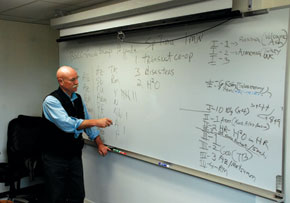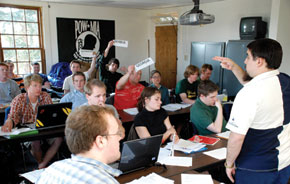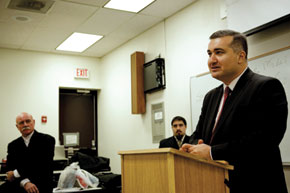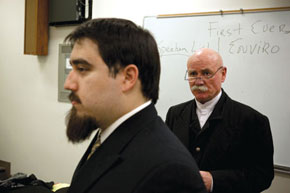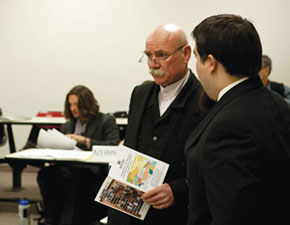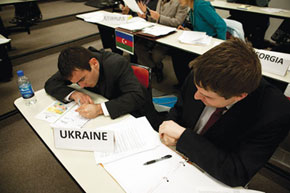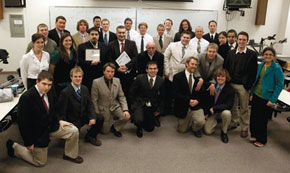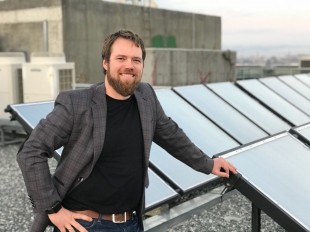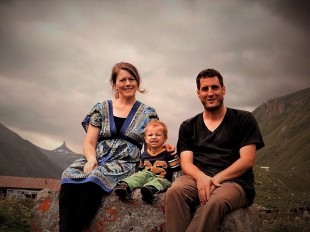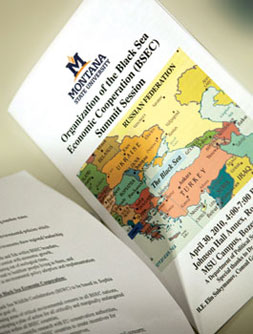 Pages 18-22
Pages 18-22Montana State University (MSU) organized a course modelled on the Black Sea Economic Cooperation during this year’s spring term. The course was led by Professor Thomas Goltz, author of ‘Azerbaijan Diary’, the brilliant first-hand account of the early years of Azerbaijan’s independence from the USSR and the Armenian invasion of Nagorno Karabagh.
As a result of his work on the course, political science senior student Colin Daniel was awarded the Heydar Aliyev Award for Excellence in Academic Work Impacting on Azerbaijan. Daniel was presented with the award on April 30 by H.E. Consul General of Azerbaijan Elin Suleymanov at MSU. Mr. Suleymanov was also instrumental in funding the final "summit" simulation of the Model Black Sea Economic Cooperation class.
Colin Daniel said of his award:
“I am just proud to have participated in the creation of this simulation. Receiving the Heydar Aliyev Prize was a tremendous honour and the Prize, along with the experience of the class, will serve me well as I continue on with my education.”
We asked Colin to tell us more about the course and present his report below.
The theory....
It began when the Department of Political Science at Montana State University (MSU) offered a brand new model simulation for the spring semester of 2010. With the support and encouragement of the head of the Department of Political Science Dr. Jerry Johnson, Professor Thomas Goltz set about creating a new model simulation that would broaden the horizons of international study in the department. He wanted to find an organization that included amongst its member states the countries of the South Caucasus. After previously teaching the Model Arab League, the BSEC was chosen because it is a largely ignored organization that encompasses a wide diversity of members and issues.
“After having taken over the MSU simulation of the Model Arab League (MAL) in January, 2008 and successfully led the MSU team to victory over our University of Montana rival for three years, I started casting around for a structure that would allow my MAL students to further develop their debating skills and present them with new intellectual challenges in real-world political issues, as well as somehow allowing me to include Azerbaijan (and the post-Soviet Caucasus) into the MSU curriculum. Accordingly, I started casting around for real-world international organizations to which Azerbaijan belonged.” – Professor Goltz on www.msubsec.com
The organization Professor Goltz chose was the Organization of the Black Sea Economic Cooperation (BSEC). Established in 1992 to address transnational economic issues following the signing of the Belavezha Accord and the political void it left in the Black Sea region, BSEC is normally overlooked in the world of regional transnational organizations. In addition to the six Black Sea littoral states of Turkey, Bulgaria, Romania, Ukraine, Russia and Georgia, BSEC is also comprised of Albania, Armenia, Azerbaijan, Greece and Moldova, countries that were all founding members, but none of which border the Black Sea; nor does the twelfth BSEC member, Serbia. The vast disparity in economic, social and military power amongst member states makes the BSEC a unique organization. The political relationships between members are also intriguing because of the organisation’s complexity. With numerous territorial disputes (Transdniester, Abkazia, South Ossetia,) the ongoing situation with Mountainous Karabagh, the fact that several members are also EU members, five states being NATO members, whilst seven were members of the Warsaw Pact, all combine to form a very complicated picture indeed.
A black hole in education
"The BSEC class has provided me with an in-depth look at a region of the world that I have found to be disappointingly overlooked in my education. Having learned nothing about the BSEC organization or the Black Sea Region in the past, I am now ashamed to have never spared any thought for the region.” - Garrett Lenderman (Political Science Major and delegate from the Republic of Serbia in the BSEC simulation)
After receiving funding for the enterprise, Professor Goltz sought to establish the parameters and procedures for the class. He had the assistance of three student aides in implementing this strategy of the programme and in the execution of the simulation itself. One of these students – myself - was especially versed in the finer points of the adopted parliamentary procedure, which greatly assisted in teaching the procedure to the other students. It should be noted that these decisions were made prior to the beginning of the class itself.
The practice
The final summit itself was scheduled to last three and a half hours. Opening remarks were given by Chair Colin Daniel (myself), who then called on Professor Goltz to provide a brief overview for the faculty and guests in attendance. These included Political Science chair Dr Jerry Johnson, former Montana State Energy Commissioner Bob Raney, Environmental expert (and author) Scott McMillion and others, including my mom and dad! Following this, the ‘First Ever Model BSEC Simulation’ was gavelled into session, with one student giving an explanatory speech as to the operations of each working group. The first was the so-called ‘Soft Security’ working group; the second was ‘Environment’ and the third ‘Energy.’
After brief opening remarks from the delegates, a caucus was called so the support needed for the introduction of resolutions could be garnered. After the introduction of resolutions, debate ensued. This was enjoyed by our guests as well as the ‘delegates,’ many of whom used favourite turns-of-phrase honed over the semester.
A decision was made to strictly enforce a forty minute time limit per committee/working group. The delegations cooperated in this manner by passing many resolutions “by consent.” The summit concluded with the suspension of the last working group.
The response
At this point we heard from several more speakers. Professor Goltz gave his impressions of the class and the summit. They were positive in all regards. Then, after thanking the students for their participation, he introduced the final speaker: H.E. Elin Suleymanov, Consulate General of the Republic of Azerbaijan in Los Angeles, our distinguished guest at the summit session. The Consulate General had very positive things to say about our class and its students and professor, many laced with humour. He particularly noted that the often acerbic interactions between the delegation representing his own country and the delegation from Armenia seemed accurate, but noted that in actual diplomacy there is often a lot of off-stage dialogue. He specifically noted that the attitude of the Russian delegation was ‘spot-on’ in its attitude towards the other delegates.In conclusion
His critique of the summit and the class are applicable to many model simulations. The topics up for debate are seldom easy to resolve, but are often resolved to some degree or another. This reflects both the superficiality of the representations of the countries and the efficacy of the organization being modelled. With regard to the representation of the countries’ positions, as these are not diplomats or privy to the same information as their real life counterparts, it will surely be the case that they do not represent their countries precisely. The 2010 Model BSEC in the Department of Political Science at Montana State University was a success. If the proper steps are taken, this success can be replicated virtually anywhere.
The first requirement is support. This entails that either the school or an outside organization is willing to fund the endeavour. With the general lack of international understanding that currently pervades both academia and society at large, the model simulation can prove to be an invaluable tool to broaden the horizons of the leaders of tomorrow.
Before this exercise, most students held the same level of understanding about the region that the general public holds. That is to say they had little understanding at all. The class taught them a tremendous amount about the regional politics of the organization.
“The structure of the class (formal debate) proved to be an excellent and entertaining way to gain an in depth understanding of the region´s social, political, economic, geographical and security issues. This class is necessary for a complete education in the field of political science, and I hope more universities will offer similar classes so that their students may receive the same type of insight on what will become, if it has not already, the most important player in the shaping of the western world. Having been left thirsty for more, this class has inspired me to continue independent research of the region". - Garrett Lenderman
-Colin Daniel, Chair, MSE-BSEC 2010 simulation
Montana moves east
Thomas Goltz, who once led a pioneering motorcycle odyssey along the Baku-Tbilisi-Ceyhan pipeline route, will be back in the Caucasus this summer to take a group of his students through Azerbaijan Georgia and Turkey on a further exploration of the commercial, environmental and energy issues along the ‘East-West Energy Corridor’. ‘Visions of Azerbaijan’ will be reporting on this latest adventure in direct action education.
